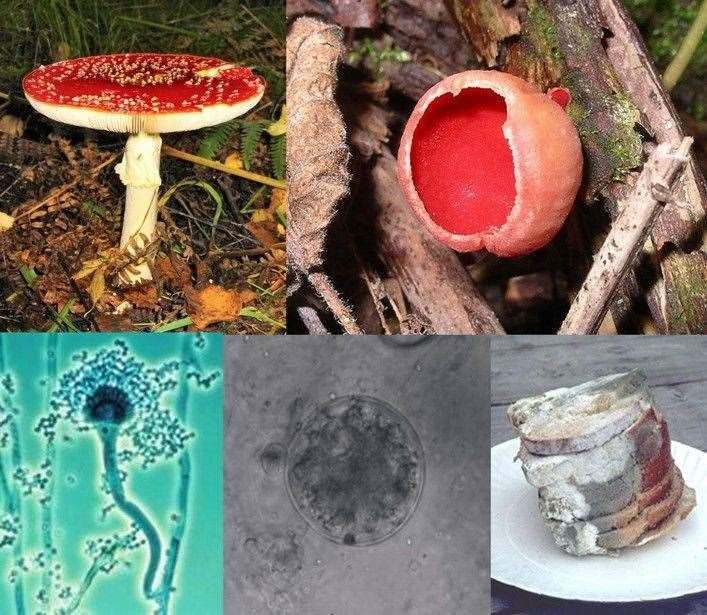Background
What Are Fungi?
Fungi constitute a diverse group of organisms, ranging from single-celled to complex multicellular forms. Predominantly terrestrial, they thrive mainly in soil and on plant matter rather than in aquatic environments. Alongside bacteria, fungi decompose organic material, releasing vital elements like carbon, oxygen, nitrogen, and phosphorus back into the ecosystem. While beneficial in many contexts, some fungal species can be harmful to humans, animals, and plants, causing conditions such as mildew, canker, ringworm, or thrush.
Amerigo Scientific provides a comprehensive range of high-quality fungi related antibody products. These products are designed to aid researchers worldwide in advancing their understanding of fungal infections, developing effective diagnostic tools, and discovering novel therapeutic interventions. With exceptional performance and specificity, our antibodies empower scientists to address the global challenge of fungal diseases.
 Fig.1 Characteristics of fungi.
Fig.1 Characteristics of fungi.
Benefits & Dangers of Fungi
| BENEFITS |
|
DANGERS |
Antibiotics and Enzyme Sources
Fungi are an important source of antibiotics (i.e. penicillin-produced by Penicillium mold) and enzymes (i.e. amylase-produced by Aspergillus mold). |
 Distributed under CC BY-SA 2.5, from Wiki, without modification. Distributed under CC BY-SA 2.5, from Wiki, without modification. |
Plant Diseases
Fungi cause 70%-80% of plant diseases, significantly harming crops and reducing agricultural yields. |
Food Production and Improvement
Yeast ferments beer, and wine, and aids in baking, while fungi produce citric, oxalic, and glucose acids. Fungal enzymes improve food texture, flavor, and digestibility. |
Food Contamination
Some fungi produce mycotoxins, toxic metabolites that can contaminate food, leading to health issues and reduced food quality. |
Nutritional Value
Edible fungi, like mushrooms, are nutritious, containing protein, vitamins, and minerals. Wild or cultivated, they are consumed globally for their health benefits and unique flavors. |
Human Health Issues
Fungi cause health issues like skin infections, life-threatening respiratory infections (e.g. fungal pneumonia), and allergic reactions. |
Ecosystem Services
Fungi are vital for ecosystem health, aiding in organic matter decomposition and nutrient recycling, which maintains soil fertility. They also form beneficial partnerships with plants, improving their nutrient and water uptake. |
Ecosystem Imbalance
Fungi are vital for decomposing organic matter and nutrient cycling in ecosystems, but overgrowth can disrupt ecosystem balance and affect plant and animal health. |
Biological Control
Certain fungi act as natural biocontrol agents, helping manage agricultural pests and diseases, thereby decreasing reliance on chemical pesticides. |
Indoor Air Quality
Indoors, fungi can grow on damp surfaces, leading to mold growth. Mold spores can cause respiratory irritation and allergies in sensitive individuals. |
Fungi and Human Diseases
Fungi impact human health in various ways, including causing toxic reactions, parasitic infections, and triggering allergic responses.
- Fungal Poisoning: Fungi often produce toxic chemicals to defend against parasites and predators. Ingesting these toxic fungi often leads to digestive issues, hallucinations, organ failure, or even death.
- Fungal Parasites: Certain fungi have the capability to act as human parasites, leading to diseases. A notable example is the yeast Candida, which causes candidiasis, leading to a serious and potentially life-threatening condition.
- Fungal Allergies: Mold allergies are common and result from inhaling airborne mold spores, which trigger immune responses like sneezing, coughing, and breathing difficulties. People with asthma or other respiratory issues may experience more severe symptoms. Prolonged exposure to mold spores also weakens the immune system.
Some fungal diseases that frequently occur in humans are listed below:
|
- Talaromycosis (Penicilliosis)
|
|
|
|
|
|
|
|
|
|
- Ringworm and Fungal Nail Infections
|
|
|
Amerigo Scientific is a leading provider of high-quality fungi-related antibody products that enable researchers to delve deeper into fungal biology, immunology, and infectious diseases. If you want to learn more about our comprehensive range of fungi related antibody products and how they can elevate your research, please contact us.


 Fig.1 Characteristics of fungi.
Fig.1 Characteristics of fungi.


